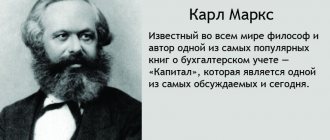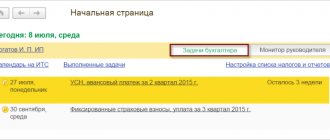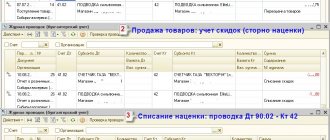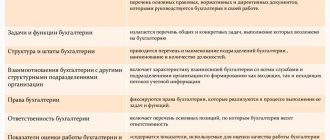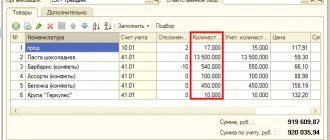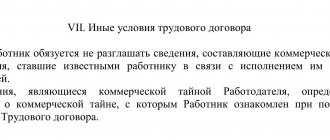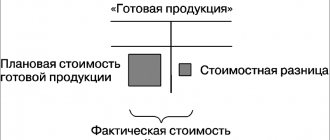General provisions
1.1. The main accounting department, being an independent structural unit of the enterprise, is created and liquidated by order of [name of the position of the head of the enterprise] simultaneously with the creation or liquidation of the enterprise.
Note: The name of this division is determined at the enterprise. This could be: “Accounting”, “Chief Accountant Department”, “Central Accounting”, “Accounting, Reporting and Control Department”, “Finance and Accounting Department”. However, it should be remembered that if an enterprise has created internal divisions in structural divisions (for example, departments) responsible for accounting (bureaus, sections, etc.) within the division (department), then the name of the head accounting division must be designated more clearly. The use of the concept “General Accounting Department” in such cases is most acceptable.
1.2. The main accounting department reports directly to [name of the position of the head of the enterprise].
1.3. The main accounting department is headed by the chief accountant, appointed to the position by order of [name of the position of the head of the enterprise].
1.4. During the absence of the chief accountant (business trip, vacation, illness, etc.), the management of the main accounting department is carried out by his deputy, and in the absence of the latter - by another official, which is announced by order of the enterprise.
1.5. In its activities, the chief accounting department is guided by:
— Law of the Russian Federation on accounting;
— accounting provisions;
— other regulatory legal documents on accounting;
— the charter of the enterprise;
- the present position.
1.6. [Enter as appropriate].
back to contents
2. Structure
2.1. The structure and staffing of the main accounting department is approved by [name of the position of the head of the enterprise] upon the recommendation of the chief accountant and in agreement with the [HR department, department of organization and remuneration].
2.2. The general accounting department may include structural divisions (services, groups, sectors, bureaus, etc.).
For example: bureau (sector, group) for accounting of fixed assets and intangible assets, bureau (sector, group) for financial and settlement operations, bureau (sector, group) for consolidated accounting and reporting, bureau (sector, group) for accounting for finished products and their sales, bureau (sector, group) of settlements with employees of the enterprise, bureau (sector, group) of financial control and audit.
2.3. Regulations on the divisions of the main accounting department (bureaus, sectors, groups, etc.) are approved by the chief accountant, and the distribution of responsibilities between employees of the divisions is carried out by [heads of bureaus, sectors, groups].
2.4. [Enter as appropriate].
back to contents
4. Functions
The main accounting department performs the following functions:
4.1. Formation of accounting policies in accordance with accounting legislation, as well as based on the structure, characteristics of the enterprise’s activities and the need to ensure its financial stability.
4.2. Development and adoption of a working chart of accounts, forms of primary accounting documents used to formalize business transactions for which standard forms are not provided.
4.3. Development of internal accounting document forms.
4.4. Ensuring the order of inventory taking. Controlling business operations.
4.5. Ensuring compliance with accounting information processing technology and document flow procedures.
4.6. Organization of accounting and reporting at the enterprise and in its divisions based on maximum centralization of accounting and computing work and the use of modern technical means and information technologies, progressive forms and methods of accounting and control.
4.7. Timely submission in the prescribed manner of complete and reliable accounting information about the activities of the enterprise, its property status, income and expenses.
4.8. Development and implementation of measures aimed at strengthening financial discipline.
4.9. Accounting for property, liabilities and business transactions, incoming fixed assets, inventory and cash.
4.10. Timely reflection in the accounting accounts of transactions related to the movement of fixed assets, inventory and cash.
4.11. Timely accounting of production and distribution costs, execution of cost estimates, sales of products (performance of work, provision of services), results of the economic and financial activities of the enterprise, as well as financial, settlement and credit transactions.
4.12. Drawing up economically sound reporting calculations of the cost of products (work performed, services provided).
4.13. Ensuring timely payroll payments.
4.14. Correct calculation and transfer of taxes and fees to the federal, regional and local budgets, insurance contributions to state extra-budgetary social funds, payments to banking institutions, funds for financing capital investments.
4.15. Repayment of bank loan debts on time.
4.16. Allocation of funds for material incentives for employees of the enterprise.
4.17. Participation in conducting an economic analysis of the economic and financial activities of an enterprise based on accounting and reporting data in order to identify on-farm reserves, eliminate losses and non-production costs.
4.18. Taking measures to prevent shortages, illegal spending of funds and inventory items, violations of financial and economic legislation of the Russian Federation.
4.19. Participation in the preparation of materials on shortages and thefts of funds and inventory items.
4.20. Taking measures to ensure the accumulation of financial resources to ensure the financial stability of the enterprise.
4.21. Interaction with banks on the placement of available funds on bank deposits (certificates) and the acquisition of highly liquid securities; control over accounting operations with deposit and loan agreements, securities.
4.22. Ensuring strict adherence to staffing, financial and cash discipline, estimates of administrative, economic and other expenses; the legality of writing off shortages, receivables and other losses from accounting accounts; safety of accounting documents, execution and delivery of them in the prescribed manner to the archive.
4.23. Development and implementation of rational planning and accounting documentation, progressive forms and methods of accounting based on the use of modern computer technology.
4.24. Drawing up a balance sheet and operational summary reports on income and expenses of funds, on the use of the budget, as well as other accounting and statistical reporting, submitting them in the prescribed manner to the relevant authorities.
4.25. Checking the organization of accounting and reporting in production (structural) divisions of the enterprise (conducting documentary audits).
4.26. Review and signing by the chief accountant of documents serving as the basis for the acceptance and issuance of funds and inventory, as well as credit and settlement obligations.
4.29. Review and endorsement by the chief accountant of contracts and agreements concluded by an enterprise for the receipt or release of inventory and for the performance of work and services, as well as orders and instructions on the establishment of official salaries and wage allowances for employees, and provisions on bonuses.
4.28. [Enter as appropriate].
back to contents
Regulations on Accounting
This Regulation on Accounting reveals the main functions and tasks of the accounting department of an enterprise, as well as the rights and responsibilities of the accounting department.
REGULATIONS ON ACCOUNTING
We recommend attending financial seminars
for economists and financiers.
Schedule for this quarter >>>
1. General Provisions
1.1. This Regulation on the accounting department of the Financial Department of the Company (hereinafter referred to as the Department) is an internal document of the Company that defines the legal status, tasks and functions, structure and procedure for formation, rights and responsibilities of the Accounting Department.
1.2. Accounting is a structural unit of the Department and reports to the Chief Accountant, as well as the Financial Director of the Company in accordance with the organizational structure of the Company and the order of the General Director of the Company.
1.3. The accounting department in its activities is guided by the legislation of the Russian Federation, the Charter of the Company, decisions of the Board of Directors of the Company, internal documents of the Company, instructions of the Chief Accountant, Financial Director and these Regulations.
1.4. The accounting department interacts with structural divisions in the manner determined by the Company’s internal documents.
2. Main tasks of accounting
2.1. Maintaining reliable accounting, tax and management records of the financial and economic activities of the Company.
2.2. Formation and submission of accounting, tax and management reporting of the financial and economic activities of the Company.
2.3. Interaction with state tax and other authorities within the limits of their competence.
2.4. Interaction with counterparties and financial organizations within their competence.
2.5. Making payments in cash and non-cash form in the manner determined by the internal documents of the Company.
2.6. Tax planning. Monitoring of current legislative and regulatory documents.
3. Basic functions of accounting
3.1. Formation of accounting and tax policies in accordance with current legislation and the needs of the Company;
3.2. Preparation and adoption of a chart of accounts, forms of primary accounting documents used for registration of business transactions, development of forms of internal accounting documents;
3.3. Timely provision of complete and reliable accounting and management information about the Company’s activities, its property status, income and expenses;
3.4. Implementation of measures aimed at strengthening financial discipline;
3.5. Accounting for all business transactions of the Company;
3.6. Accounting for the execution of the Company's budgets;
3.7. Tax accounting of the Company, preparation and timely submission of tax and other reporting required by law;
3.8. Drawing up a balance sheet, other accounting, tax, management and statistical reporting;
3.9. Timely submission of financial statements to tax authorities, statistical authorities, extra-budgetary funds and other authorities;
3.10. Correct calculation and timely transfer of taxes and fees to the federal, regional and local budgets, insurance contributions to state extra-budgetary social funds, as well as other payments in accordance with the law;
3.11. Tax planning. Monitoring of current legislative and regulatory documents.
3.12. Making payments in cash and non-cash form in the manner determined by the Company’s internal documents;
3.13. Settlements for wages and other payments with Company employees. Issuing certificates to Company employees on issues of payroll and other payments, as well as deductions from them;
3.14. Carrying out an inventory of fixed assets, inventories, cash, settlements with counterparties;
3.15. Participation in conducting an economic analysis of the financial and economic activities of the Company based on accounting and management accounting and reporting data in order to identify internal reserves, eliminate losses and non-production costs;
3.16. Participation in the implementation of advanced information systems for financial management in accordance with the requirements of accounting, tax statistical and management accounting, control over the reliability of information;
3.17. Taking measures to prevent shortages, illegal spending of funds and inventory, violations of legislation and internal regulations of the Company;
3.18. Participation in signing agreements with the Company’s counterparties;
3.19. Participation in the Company’s claims work;
3.20. Interaction with internal and external auditors of the Company.
4. Structure and procedure for the formation of accounting
4.1. The number of members of the Accounting Department is determined in accordance with the tasks and functions of the Accounting Department and is established by the staffing table approved by the General Director of the Company.
4.2. The work of the Accounting Department is managed by the Chief Accountant, who is appointed and dismissed by the General Director of the Company.
4.3. During the absence of the Chief Accountant (during vacation, illness, business trip, other cases), his rights and responsibilities, in accordance with the instructions of the Financial Director, are assigned to another employee of the Accounting Department.
4.4. Employees of the Accounting Department are appointed and dismissed by the General Director of the Company on the recommendation of the Chief Accountant and Financial Director.
4.5. The responsibilities of each employee of the Accounting Department are specified in job descriptions approved by the General Director.
4.6. The distribution of responsibilities between Accounting employees and the establishment of deadlines for completing work is carried out by the Chief Accountant in accordance with job descriptions and these Regulations.
5. Rights and responsibilities of accounting
5.1. The accounting department has the right, in accordance with the procedure established by the Company:
5.1.1. Organize the implementation of decisions of the Company’s management bodies on issues within the competence of the Accounting Department, including giving instructions to other structural divisions of the Company, organizing meetings with the participation of managers and specialists of structural divisions on issues related to the implementation of these decisions.
5.1.2. Request from structural divisions documents, materials, certificates and other information (information) necessary to perform the tasks and functions assigned to the Accounting Department.
5.1.3. Prepare requests to state authorities and local governments on issues within the competence of the Accounting Department.
5.1.4. Send requests to structural units to provide opinions necessary to carry out the tasks and functions of the Accounting Department.
5.1.5. Participate in the coordination of draft documents (decisions) prepared by other departments, regarding issues within the competence of the Accounting Department.
5.2. Accounting is obliged:
5.2.1. Carry out the functions assigned to the Accounting Department in accordance with the requirements of the legislation of the Russian Federation, the charter and internal documents of the Company.
5.2.2. Implement decisions of the Company’s management bodies on issues within the competence of the Accounting Department in the manner and within the time limits established by internal documents.
5.2.3. Timely prepare documents on issues within the competence of the Accounting Department by these Regulations and other internal documents of the Company.
5.2.4. Timely provide information, documents, conclusions at the request of structural units on issues within the competence of the Accounting Department.
5.3. As part of the organization of the work of the Accounting Department, the Chief Accountant has the right to:
5.3.1. On the basis of a power of attorney, act on behalf of the Company in relations with state authorities and local governments, and with other organizations.
5.3.2. In the manner and within the limits established by the General Director of the Company and the Financial Director, sign documents related to the implementation of the tasks and functions assigned to the Accounting Department;
5.3.3. Endorsement of documents approved by the Accounting Department regarding issues within the competence of the Accounting Department;
5.3.4. Give written and oral instructions to employees of the Accounting Department on the organization of the work of the Accounting Department and the implementation of the functions of the Accounting Department;
5.3.5. Make proposals to the General Director of the Company and the Financial Director on attracting consultants and experts necessary to resolve issues within the competence of the Accounting Department.
5.3.6. Submit, in the prescribed manner, proposals to the General Director of the Company regarding the hiring and dismissal of Accounting Department employees, and the establishment of official salaries and allowances for them.
5.3.7. On behalf of the Company, warn Accounting Department employees on the basis of orders/instructions of the General Director about significant changes in working conditions and/or reduction in the number (staff) of Accounting Department employees.
5.3.8. Make proposals to the General Director of the Company on encouraging Accounting employees or bringing them to disciplinary/material liability in the manner established by the labor legislation of the Russian Federation and internal documents of the Company.
5.3.9. Exercise other rights arising from the competence of the Accounting Department.
5.4. The chief accountant is obliged to:
5.4.1. Organize the work of the Accounting Department and ensure high-quality and timely performance by Accounting Department employees of the tasks and functions assigned to the Accounting Department.
5.4.2. Ensure that Accounting Department employees do not disclose information about the Company that constitutes a commercial and/or official secret.
5.4.3. Organize office work in the Accounting Department.
5.4.4. Ensure that Accounting employees comply with labor discipline.
6. Accounting Responsibilities
The Chief Accountant and employees of the Accounting Department, in accordance with the distribution of rights and responsibilities established by these Regulations, job descriptions and other internal documents of the Company, are responsible for:
6.1.Results of the Accounting Department’s work in fulfilling the tasks and functions established by these Regulations.
6.2. Causing losses to the Company as a result of the exercise of their official rights and obligations.
6.3. Violation of the legislation of the Russian Federation, the charter and internal documents of the Company in the activities of the Company on issues within the competence of the Accounting Department.
6.4. Disclosure of information about the Company related to commercial and/or official secrets.
| We invite you to our seminars on finance >>> |
Financial service organization
Regulations on the Financial Department
Job description of the chief accountant
Accountant job description
View upcoming seminars on finance >>>
5. Rights
5.1. The main accounting department has the right:
— require all departments of the enterprise to comply with the procedure for processing transactions and submitting the necessary documents and information;
— demand from the heads of the structural divisions of the enterprise and individual specialists to take measures aimed at increasing the efficiency of using the enterprise’s funds, ensuring the safety of the enterprise’s property, ensuring the correct organization of accounting and control in particular:
Revision of inflated and outdated standards for the consumption of raw materials, materials, labor costs and other standards;
Improving warehouse and weighing facilities, proper organization of acceptance and storage of raw materials, materials and other valuables, increasing the validity of the release of these valuables for the needs of production, maintenance and management;
Carrying out measures to improve control over the correct application of norms and standards, organizing correct primary accounting of product output and movement of parts and semi-finished products, organizing quantitative accounting of the use of raw materials and supplies in workshops and production areas;
— check in the structural divisions of the enterprise compliance with the established procedure for acceptance, posting, storage and expenditure of funds, inventory and other valuables;
— make proposals to the management of the enterprise on bringing to material and disciplinary liability the officials of the enterprise based on the results of inspections;
- do not accept for execution and registration documents on transactions that contradict the law and the established procedure for the acceptance, storage and expenditure of funds, inventory and other valuables, as well as without the appropriate order of [name of the position of the head of the enterprise] and the head of the legal department;
— conduct correspondence on accounting and reporting issues, as well as other issues that are within the competence of the main accounting department and do not require approval from the head of the enterprise;
- represent in the prescribed manner on behalf of the enterprise on issues within the competence of the main accounting department in relations with tax, financial authorities, bodies of state extra-budgetary funds, banks, credit institutions, other state and municipal organizations, as well as other enterprises, organizations, institutions.
— in agreement with [name of the position of the head of the enterprise]
Or, as his deputy for commercial matters, engage experts and specialists in the field of accounting for consultations, preparation of opinions, complaints and proposals.
5.2. The chief accountant has the right:
- in case of detection of illegal actions of officials (additions, misuse of funds and other violations and abuses), report to [name of the position of the head of the enterprise] for taking measures;
— make proposals to the personnel department and the management of the enterprise on the relocation of employees of the main accounting department, their encouragement for successful work, as well as proposals on the imposition of disciplinary sanctions on employees who violate labor and financial discipline;
— give consent or refuse it on issues of appointment, dismissal and relocation of employees of the general accounting department;
- [fill in what you need].
5.3. The requirements of the general accounting department regarding the procedure for processing transactions and submitting the necessary documents and information to the accounting department are mandatory for all divisions of the enterprise.
5.4. [Enter as appropriate].
back to contents
The accounting department of industrial enterprises and other business organizations is headed by a chief accountant, whose rights and responsibilities are determined by the Regulations on Chief Accountants, approved by the Council of Ministers of the USSR on January 24, 1980 No. 59. According to this Regulation, the chief (senior) accountant is obliged to ensure the correct organization of accounting.
He, along with the head of the enterprise, bears full responsibility for compliance with financial, budgetary and budgetary discipline. The chief accountant is the state controller at the enterprise. In this regard, he is placed in a special position. The chief accountant reports to the head of the enterprise only administratively. On issues of accounting and reporting, he reports only to the chief accountant of a higher organization. The appointment, dismissal and relocation of the chief accountant are made by a higher organization upon the recommendation of the head of the enterprise and with the consent of the chief accountant of the higher organization. [p.65] The accounting department of industrial enterprises and other business organizations is headed by a chief accountant, whose rights and responsibilities are defined by the Regulations on Chief Accountants, approved by the Council of Ministers of the USSR on January 24, 1980 No. 59. According to this Regulation, the main responsibilities of chief accountants are as follows [p.65] p.66] Approaches to inventory in our country and abroad are different. In Russia, the chief accountant, although he cannot be assigned responsibilities related to financial responsibility for monetary and material assets (according to the Regulations on Chief Accountants [27]), must carefully monitor and actively participate in the conduct of inventories and in the preparation of preventive measures shortages and thefts. Checking the availability of valuables is carried out not only by value, but also by quantity (the quantity must correspond by object; replacing one item number with another is not allowed). In Western accounting, inventory is not a function of accounting; it is carried out by other technical personnel; the accountant only verifies the valuation of valuables. [p.90]
Definition of job responsibilities of accounting employees. The manager, in accordance with the Regulations on Chief Accountants, determines the procedure for appointing and dismissing the chief accountant and his powers. The chief accountant approves the document flow schedule, forms and deadlines for submitting accounting registers, establishes a list of job responsibilities and duties.
The fourth section (Rights and responsibilities of management) includes the job description of the chief accountant, drawn up on the basis of the Federal Law on Accounting, the Regulations on Accounting and Financial Reporting in the Russian Federation and the Regulations on Chief Accountants (current [p.559]
Regulations on chief accountants. Approved by Resolution of the USSR Council of Ministers dated August 24, 1980 No. 59. [p.630]
The accountant is guided in his work by the Regulations on the General Accounting Department and this job description. [p.338]
REGULATIONS ON THE CHIEF ACCOUNTANT [p.402]
During the absence of the chief accountant (business trip, vacation, illness, etc.), his duties are performed by a deputy, who enjoys the rights and bears responsibility in accordance with these Regulations, and in the absence of a deputy, the duties of the chief accountant are performed by an employee appointed by order of the General Director, who also enjoys rights and bears responsibility in accordance with the Regulations on the Chief Accountant. [p.402]
The chief accountant is guided in his activities by the legislation of the Russian Federation, the Regulations on chief accountants, and the regulations on the chief accountant of an enterprise. [p.178]
Chief accountants of centralized accounting departments in their activities are guided by the Regulations on Chief Accountants, approved by Resolution of the Council of Ministers of the USSR of January 24, 1980 No. 59 [24.46]. In accordance with this Regulation, the chief accountant provides, at each enterprise and organization served by centralized accounting, accounting for cash, inventory, labor and wages, fixed assets, as well as credit and settlement transactions, production costs and calculation of production costs , income, profit, as well as preparation of established reporting. Organizes rational document flow and on-farm control over the safety of socialist property, rational use of labor, material and financial resources. Participates in the implementation of economic analysis of the activities of enterprises and organizations. Chief accountants of centralized accounting departments are subject to the Regulations on Chief Accountants in terms of rights and obligations in relation to each serviced enterprise. [p.360]
Accounting management in production associations and enterprises is carried out in accordance with the Regulations on Chief Accountants, approved by Resolution of the Council of Ministers of the USSR dated January 24, 1980 No. 59 [24.46], which applies to chief accountants of associations, enterprises and organizations where accounting is maintained and completed financial statements are prepared. [p.364]
In the implementation of these decisions, the leading place is occupied by accounting workers and, in particular, the chief accountant. The Regulations on Chief Accountants, approved by Resolution of the Council of Ministers of the USSR of January 24, 1980 No. 59, provides for the responsibility of the chief accountant on an equal basis with the head of the association or enterprise for violation of the rules and regulations governing financial and economic activities [24.46, p. 8]. Thus, the chief accountant is the state controller for the rational use of resources of associations and enterprises, and compliance with economic legislation. [p.378]
Regulations on chief accountants. M. Finance, 1980. [p.391]
Regulations on chief accountants. Approved by Resolution of the Council of Ministers of the USSR of January 24, 1980 No. 59. - SP USSR, 1980, No. 6, Art. 43. [p.62]
Primary documents on cash transactions, transactions with inventory assets, credit and settlement obligations must be drawn up taking into account the requirements of the provisions on chief accountants, centralized accounting departments, and cash transactions. The head of the enterprise approves, in agreement with the chief accountant, a list of persons who have the right to sign primary documents. [p.208]
The direct tasks and functions of the chief accountant at the lower level of management of a sector of the national economy are defined in the Regulations on chief accountants. [p.138]
The centralized accounting department is headed by the chief accountant, who performs his functions in accordance with the Regulations on Chief Accountants. The chief accountant is appointed and dismissed by the head of the road on the recommendation of the head of the road department and in agreement with the head of the accountant service [p.14]
The chief accountant carries out preliminary, current and subsequent control. His control responsibilities are determined by the Regulations on Chief Accountants (see Chapter II, 2). The chief accountant, together with the heads of relevant departments and services, is obliged to carefully monitor [p.15]
The regulations on chief accountants provide for the active participation of accounting workers in the development and implementation of measures aimed at maintaining state discipline and strengthening economic accounting. [p.16]
The second direction of communication is to conduct economic analysis on a number of sections by employees of the accounting department. The Regulations on Chief Accountants provide for their participation in the implementation of economic analysis of the activities of the association, enterprise and their divisions in order to identify intra-economic reserves, prevent losses and unproductive expenses. [p.17]
The Regulations on Chief Accountants establish common goals and objectives in the organization of accounting, the unity of its foundations and methodology for all associations, enterprises, organizations and institutions of our country. It determines the role and place of the chief accountant in the management apparatus; this position was established in order to strengthen state order in the accounting of funds, inventory and property assets, and to suppress their illegal expenditure. [p.40]
The use of computer and other organizational technology in the accounting of production associations (enterprises) is the most important condition for improving its quality, increasing the productivity of accounting workers, strengthening the control functions of accounting, and increasing its analyticality. Significantly facilitating the work of accounting workers, mechanization and automation of accounting in industry contribute to the improvement of primary documentation, its simplification, rationalization of document flow, make accounting more efficient, and reduce reporting time. That is why one of the important functions assigned to the chief accountant of a production association (enterprise) by the Regulations on Chief Accountants is extensive mechanization and automation of accounting and computing work. [p.50]
REGULATIONS ON THE GENERAL ACCOUNTING DEPARTMENT [p.152]
The head of the cost accounting sector is guided in his work by the Regulations on the General Accounting Department and this job description. [p.329]
The head of the sector of settlements with workers, specialists and employees is guided in his work by the Regulations on the General Accounting Department and this job description. [p.330]
Regulations on the chief accountant [p.123]
Regulatory approaches vary enormously internationally (see Chapter 2). And in Russia over the past decades, these approaches have undergone a certain evolution. During the years of Soviet power, accounting was regulated by the so-called by-laws - instructions, regulations, regulations and methodological guidelines, which were issued by ministries and departments of the country and republics; the accounting methodology was set by the Ministry of Finance of the USSR. The main regulations in the field of accounting were the so-called Regulations on Chief Accountants, Regulations on Accounting Records and Balance Sheets, etc. These were prescriptive documents that practically did not give the accountant the opportunity to choose accounting procedures. They regulated the accountant's actions in the form of standard entries and set a strict reporting structure. [p.182]
During the years of Soviet power, the role of central authorities in regulating accounting and reporting increased sharply. It was believed that reporting was supposed to provide information support for the dominant vertical connections between economic entities at that time. The basic regulations in the field of accounting were the so-called Regulations on Chief Accountants, Regulations on Accounting Reports and Balance Sheets, etc. The main trend in the regulation of reporting in the Soviet period was the strict regulation of its composition. Reporting formats were developed by the Ministry of Finance and could be specified by republican and line ministries. In those years, it was common practice to make changes to formats twice a year - in connection with the approval of annual and quarterly reporting. [p.181]
Relationships (official connections)**
6.1. To perform the functions and exercise the rights provided for by these regulations, the main accounting department interacts:
With the planning and economic department on issues:
— obtaining: production plans for the month, quarter, year for the enterprise as a whole and for individual structural divisions; draft wholesale and retail prices for products (tariffs for work and services); reports on the implementation of plans by structural divisions and the enterprise as a whole; [fill in as required];
— provision of: data necessary for economic planning, forecasting and analysis; balance sheet and operational summary reports on income and expenses of funds, on the use of the budget; payroll calculations; preliminary calculations of depreciation charges; accounting data for property, liabilities and business transactions, incoming fixed assets, inventory and cash; [fill in as required].
With production departments and technical departments (shops, departments of the chief technologist, chief mechanic, etc.) on issues:
— receiving: reports on the implementation of plans; reports on the movement of basic materials: acts for the transfer of equipment into operation, calculations on the consumption of materials per unit of production; orders, instructions, acts and other documents necessary for accounting; contracts; estimates; [fill in as required];
— providing: [fill in what is needed].
With the quality control department regarding:
— receiving: acts of product rejection; conclusions about the guilt of those responsible; conclusions on acceptance of the complaint; calculations of costs for eliminating defects; [fill in as required].
— providing: information on the results of accounting for losses from defects; information about penalties from those responsible; [fill in as required].
Contact the sales department regarding:
— receiving: shipping documentation; reports on products shipped to contractors; information on the status of product inventories in finished product warehouses; invoices issued to contractors for shipped products; data on product returns by counterparties; information on the costs incurred for the shipment of products; copies of claims and complaints presented to the company; information about spoilage, damage, loss of products; acts of write-off of products; [fill in as required];
— providing: data on the movement of products; norms of product inventories in warehouses; norms of natural loss; product inventory results; [fill in as required].
With the logistics department regarding:
— receiving: shipping documentation; reports on material and technical resources shipped by counterparties; information about the state of stocks in the warehouse of raw materials and supplies; reports on costs incurred for the acquisition of material and technical resources; [fill in as required];
— provision of: approved cost estimates for the acquisition of material and technical resources; results of inventory of material and technical resources; reporting data on the movement of raw materials and materials, their balances at the end of the reporting period; [fill in as required].
With the marketing department regarding:
— receiving: reports on costs incurred for marketing research; cost calculations for after-sales service of products; information on prices for material and technical means from suppliers, tariffs for transportation services, and promotional events; [fill in as required];
— provision of: accounting data on the movement, sales, inventories of products; results of inventory of material and technical resources; standards for entertainment, travel and advertising expenses; [fill in as required].
With the department of organization and remuneration on issues:
— obtaining: data on the use of wage funds and material incentive funds; provisions on bonuses; labor standards; calculations of labor intensity of products; [fill in as required];
— providing: information on actually accrued wages for the enterprise and for divisions; approved wage funds and material incentive funds; information about additional payments; recommendations for processing the expenditure of wage funds; [fill in as required].
From [name of structural unit] on issues:
Receipts: [enter as required];
Provided by: [fill in as required].
6.2. The main accounting department coordinates with the heads of the structural divisions of the enterprise, as well as with the department of organization and remuneration, issues of appointment, dismissal and relocation of materially responsible persons (cashiers, warehouse managers, etc.).
6.3. The Main Accounting Department provides methodological assistance to employees of enterprise departments on issues of accounting, control and reporting.
6.4. [Enter as appropriate].
back to contents
Legislative framework of the Russian Federation
not valid Edition from 01.01.1970
detailed information
| Name of document | DECISION of the Council of Ministers of the USSR dated January 24, 1980 N 59 “On MEASURES TO IMPROVE THE ORGANIZATION OF ACCOUNTING AND INCREASED ITS ROLE IN THE RATIONAL AND ECONOMIC USE OF MATERIAL, LABOR AND FINANCIAL RESOURCES” (together with “ REGULATIONS ON CHIEF ACCOUNTANTS") |
| Document type | decree, regulation |
| Receiving authority | Council of Ministers of the USSR |
| Document Number | 59 |
| Acceptance date | 01.01.1970 |
| Revision date | 01.01.1970 |
| Date of registration with the Ministry of Justice | 01.01.1970 |
| Status | It does not work |
| Publication |
|
| Navigator | Notes |
DECISION of the Council of Ministers of the USSR dated January 24, 1980 N 59 “On MEASURES TO IMPROVE THE ORGANIZATION OF ACCOUNTING AND INCREASED ITS ROLE IN THE RATIONAL AND ECONOMIC USE OF MATERIAL, LABOR AND FINANCIAL RESOURCES” (together with “ REGULATIONS ON CHIEF ACCOUNTANTS")
REGULATIONS ON CHIEF ACCOUNTANTS
I. General provisions
1. These Regulations apply to chief accountants of associations, enterprises, organizations, institutions that conduct accounting and prepare complete financial statements, as well as chief accountants of centralized accounting departments.
The specifics of application of the Regulations on collective farms are determined by the Union Council of Collective Farms.
2. Chief accountants ensure the organization of accounting in associations, enterprises, organizations, institutions and control over the rational, economical use of material, labor and financial resources, and the safety of socialist property.
3. Chief accountants are appointed and dismissed from office by bodies appointing heads of associations, enterprises, organizations, institutions, on the proposal of the heads of these associations, enterprises, organizations, institutions and heads of departments (departments) of accounting and reporting (chief accountants) of higher bodies .
The appointment and dismissal of chief accountants of enterprises and consumer cooperation organizations, as well as public organizations, are approved by a higher authority in the manner established in accordance with their charters.
The accounting departments of associations, enterprises, organizations, and institutions headed by chief accountants are their independent structural divisions (services) and should not be part of any other division (service).
4. The chief accountant reports directly to the head of the association, enterprise, organization, institution, and on issues of organizing accounting and reporting, procedures and methods for exercising control - to the head of the accounting and reporting department (department) (chief accountant) of a higher body.
5. Persons with higher specialized education are appointed to the position of chief accountant.
In necessary cases, by decision of a higher authority, a person who does not have a higher specialized education may be appointed to the position of chief accountant, if he has at least three years of work experience in his specialty.
6. Acceptance and delivery of cases upon appointment and dismissal of the chief accountant are formalized by an act after checking the state of accounting and reporting. A copy of this act is sent to a higher authority. If necessary, the reception and delivery of cases by the chief accountant is carried out with the participation of a representative of a higher authority.
7. The chief accountant cannot be assigned responsibilities related to direct financial responsibility for funds and material assets. He is prohibited from receiving funds and inventory items directly from checks and other documents for an association, enterprise, organization, or institution.
8. During the absence of the chief accountant (business trip, vacation, illness, etc.), the rights and responsibilities of the chief accountant are transferred to his deputy, and in the absence of the latter - to another official, which is announced by order of the association, enterprise, organization, institution.
9. In production (structural) units of associations, with the permission of the ministry or department, the position of chief accountant may be retained.
II. Responsibilities of chief accountants
10. The chief accountant, when organizing accounting on the basis of established rules for its maintenance, is obliged to ensure:
a) widespread use of modern means of mechanization and automation of accounting and computing work, progressive forms and methods of accounting;
b) complete accounting of incoming funds, inventory and fixed assets, as well as timely reflection in accounting of transactions related to their movement;
c) reliable accounting of production and distribution costs, execution of cost estimates, sales of products, performance of construction, installation and other works, drawing up economically sound reporting calculations of the cost of products, works and services;
d) accurate accounting of the results of economic and financial activities of an association, enterprise, organization, institution in accordance with established rules;
e) correct calculation and timely transfer of payments to the state budget, contributions to state social insurance, funds for financing capital investments; repayment of debts to banks on loans in a timely manner; contributions to economic stimulus funds and other funds and reserves;
f) participation in the work of legal services to prepare materials on shortages and thefts of funds and inventory items and control over the transfer, in appropriate cases, of these materials to judicial and investigative authorities, and in the absence of legal services, directly performing these functions;
g) checking the organization of accounting and reporting in production (structural) units of associations, as well as in production and farms allocated to a separate balance sheet, timely instruction of employees on issues of accounting, control, reporting and economic analysis;
h) drawing up reliable financial statements based on primary documents and accounting records, submitting them to the relevant authorities in a timely manner;
i) carrying out (together with other divisions and services) an economic analysis of the economic and financial activities of an association, enterprise, organization, institution based on accounting and reporting data in order to identify on-farm reserves, prevent losses and unproductive expenses;
j) necessary assistance to permanent production conferences, public groups (bureaus) of economic analysis and bodies of people's control in the use of accounting data to work to identify and mobilize on-farm reserves;
k) active participation of accounting workers in the development and implementation of measures aimed at maintaining state discipline and strengthening economic accounting;
l) timely carrying out, together with other divisions and services in the production (structural) units of associations, as well as in industries and farms allocated to a separate balance sheet, inspections and documentary audits and preparation of proposals for improving their work;
m) safety of accounting documents, execution and transfer of them in the prescribed manner to the archive.
11. The chief accountant, together with the head of the relevant departments and services, is obliged to carefully monitor:
a) compliance with the established rules for processing the acceptance and release of inventory items;
b) correct expenditure of the wage fund, establishment of official salaries, strict adherence to staffing, financial and cash discipline;
c) compliance with the established rules for conducting inventories of funds, inventories, fixed assets, settlements and payment obligations;
d) collection of accounts receivable and repayment of accounts payable within the established time limits, compliance with payment discipline;
e) the legality of writing off shortages, receivables and other losses from balance sheets.
12. If an association, enterprise, organization, or institution has an independent financial service, the chief accountant is charged with accounting for financial, settlement and credit transactions and monitoring the legality, timeliness and correctness of the execution of these transactions.
13. The chief accountant is obliged to actively participate in the preparation of measures to prevent the formation of shortages and illegal expenditure of funds and inventory items, violations of financial and economic legislation.
In case of detection of illegal actions of officials (attributions, misuse of funds and other violations and abuses), the chief accountant reports this to the head of the association, enterprise, organization, institution for taking action.
14. Documents serving as the basis for the acceptance and issuance of funds and inventory, as well as credit and settlement obligations are signed by the head of the association, enterprise, organization, institution and the chief accountant or persons authorized by them. Granting the right to sign documents to these persons must be formalized by an order for the association, enterprise, organization, or institution.
The above documents without the signature of the chief accountant or persons authorized by him are considered invalid and should not be accepted for execution by materially responsible persons and accounting employees of a given association, enterprise, organization, institution, as well as bank institutions.
15. The chief accountant is prohibited from accepting for execution and registration documents on transactions that contradict the law and the established procedure for the acceptance, storage and expenditure of funds, inventory and other valuables.
In cases where the head of an association, enterprise, organization, or institution receives an order to perform such an action, the chief accountant, without carrying it out, draws the manager’s attention in writing to the illegality of the order given by him. Upon receipt of a repeated written order from the manager, the chief accountant executes it. Full responsibility for the illegality of the transaction lies with the head of the association, enterprise, organization, institution, who is obliged to immediately inform the head of a higher body about his decision in writing.
The head of a higher body, having received the specified message, urgently reviews it and makes an appropriate decision, about which he notifies the head of the association, enterprise, organization, institution.
Disagreements between the chief accountant and the head of an association, enterprise, organization, or institution are resolved by the head of a higher body.
III. Rights of chief accountants
16. The chief accountant establishes official duties for employees subordinate to him so that each employee knows the range of his duties and is responsible for their implementation. Employees of other departments and services involved in accounting report to the chief accountant on issues of organization and maintenance of accounting and reporting.
17. The requirements of the chief accountant regarding the procedure for processing transactions and submitting the necessary documents and information to the accounting department or computing installations are mandatory for all divisions and services of the association, enterprise, organization, institution.
For failure to comply or violation of the instructions of the chief accountant arising from the implementation of the duties assigned to him, the perpetrators may, by order of the head of the association, enterprise, organization, institution, be deprived of bonuses in whole or in part, and, in necessary cases, held accountable in the manner prescribed by law.
Divisions and services of the association, enterprises, organizations, institutions:
bear full responsibility for the legality of transactions performed and the correctness of their execution;
are required to promptly transfer to the accounting department or computing installations the documents necessary for accounting and control - orders, resolutions, instructions, as well as contracts, agreements, estimates, standards and other materials.
For untimely, poor-quality execution and preparation of these documents, delay in transferring them for reflection in accounting and reporting, for the unreliability of the data contained in the documents, as well as for the preparation of documents reflecting illegal transactions, the officials who compiled and signed these documents are responsible. Lists of officials who are responsible for drawing up primary documents and who are given the right to sign them are agreed upon with the chief accountant.
18. The appointment, dismissal and relocation of financially responsible persons (cashiers, warehouse managers and others) are made in agreement with the chief accountant.
19. Contracts and agreements concluded by an association, enterprise, organization, institution for the receipt or release of inventory and for the performance of work and services, as well as orders and instructions on the establishment of official salaries, salary allowances and bonuses for employees are preliminary considered and are endorsed by the chief accountant.
20. The chief accountant has the right:
a) demand from the heads of brigades, sections, shops, departments and other divisions and services, and, if necessary, from the head of an association, enterprise, organization, institution, to take measures to increase the efficiency of the use of public funds, to strengthen the safety of socialist property, to ensure proper organization accounting and control, and in particular:
revision of inflated and outdated standards for the consumption of raw materials, materials, labor costs and other standards;
improving warehousing and weighing facilities, proper organization of acceptance and storage of raw materials, materials and other valuables, increasing the validity of the release of these valuables for the needs of production, maintenance and management;
carrying out measures to improve control over the correct application of norms and standards, organizing correct primary accounting of product production and the movement of parts and semi-finished products, organizing quantitative (natural) accounting of the use of raw materials and supplies in workshops, production areas, etc.;
b) check in the structural divisions and services of the association, enterprise, organization, institution, compliance with the established procedure for acceptance, posting, storage and expenditure of funds, inventory and other valuables;
c) prepare proposals to reduce bonuses or deprive managers of workshops, sections, brigades, departments and other divisions and services, as well as foremen and foremen who do not ensure compliance with the established rules for drawing up primary documentation, maintaining primary records and other requirements for organizing accounting and control;
d) make proposals to the relevant committees of people's control on the production of monetary settlements against officials who, through their incorrect actions or lack of management, have caused material damage to the state, cooperative and other public enterprises and organizations.
21. State and economic management bodies are obliged to provide all possible assistance to chief accountants in the performance of their duties and the use of the rights provided for by these Regulations.
Any attempts to prosecute the chief accountant for the performance of these duties and the use of rights must be resolutely suppressed, and those responsible for this must be held strictly accountable.
IV. Responsibility of chief accountants
22. The chief accountant is responsible in the following cases:
a) improper accounting, which resulted in neglect in accounting and distortions in financial statements;
b) acceptance for execution and execution of documents on transactions that contradict the established procedure for acceptance, posting, storage and expenditure of funds, inventory and other valuables;
c) untimely and incorrect reconciliation of transactions on current and other bank accounts, settlements with debtors and creditors;
d) violation of the procedure for writing off shortages, receivables and other losses from balance sheets;
e) untimely conduct of inspections and documentary audits in production (structural) units of associations, as well as in production and enterprises allocated to a separate balance sheet;
f) preparation of unreliable financial statements due to the fault of the accounting department;
g) other violations of provisions and instructions for organizing accounting.
23. The chief accountant bears the same responsibility as the head of the association, enterprise, organization, institution:
a) for violation of the rules and regulations governing financial and economic activities;
b) for untimely collection of cash balances from officials on the basis of decisions of the people's control committees;
c) for violation of deadlines for submitting quarterly and annual accounting reports and balance sheets to the relevant authorities.
24. Disciplinary, material and criminal liability of chief accountants is determined in accordance with current legislation.
In this case, a disciplinary sanction is imposed on the chief accountant in the order of subordination by the relevant higher authority.
At enterprises, organizations and institutions where the position of chief accountant is not provided, senior accountants enjoy the rights and bear responsibilities in accordance with these Regulations.

